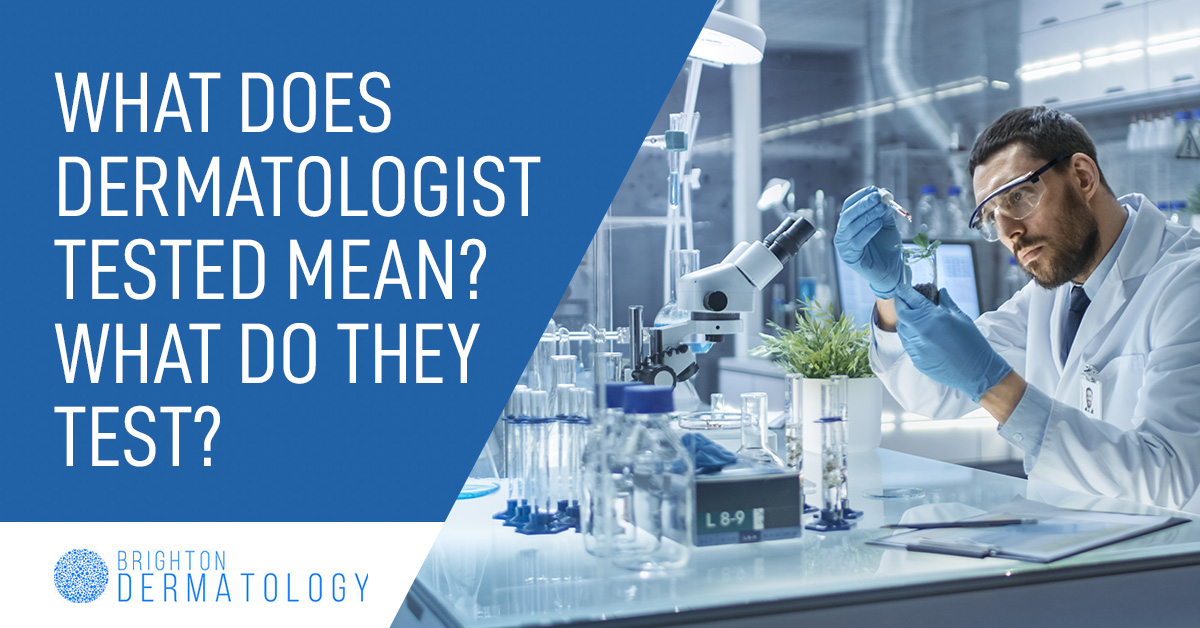Blog
What Does Dermatologist Tested Mean? What Do They Test?

Dermatology is a practice concerned with the health of skin and the treatment of diseases that affect the skin, hair, nails, and mucous membranes.
A dermatologist is a skin doctor that specialises in the treatment of skin conditions such as acne, skin cancer, and psoriasis.
Qualified dermatologists are licensed to practice dermatology and require a great deal of clinical knowledge of the numerous internal conditions that cause skin conditions.
They also provide patients with support for cosmetic problems by helping them improve the appearance of their skin.
To this end, they are knowledgeable about particular skin remedies and medications that are effective at treating different types of skin ailments which they recommend to their patients.
Medications for Skin Conditions
Most topical applications are available over the counter.
These products and many other cosmetic skin remedies often have a statement on the label that claims: “Dermatologically Tested”.
This is a popular claim that appears on many cosmetic and personal skincare products.
It is important to note that such a claim is not regulated in terms of its exact meaning, nor do any uniform standards exist in the industry on what test procedures should be followed to substantiate the claim.
What Does “Dermatologically Tested” Mean?
Dermatologically tested can mean testing anything listed under the medical practice of Dermatology.
At its most basic, it means that the product was tested by or in consultation with a dermatologist for tolerance and signs of obvious or severe skin reactions.
Dermatologically tested may mean that a doctor of dermatology may or may not have been in charge of the tolerance tests that were carried out on voluntary test persons while using the product.
The generally accepted meaning for ‘dermatologically tested’ relates to the following claims:
- That the product has been tested on human skin
- That the formula has been found to be mostly safe when applied to the skin
- That the finished product was well tolerated by persons who tested it on their skin, and in most cases, it did not cause skin reactions
However, no information is provided regarding:
- the way in which the tests were carried out
- how often the product was used and for how long
- the amount of product that was applied at any one time
- the specific body part the product was tested on
- the data regarding the results of the test
It is possible that some of the individuals that made up the sample did not tolerate the product well or not at all.
Therefore, a label that simply states “dermatologically tested” without any further, important details will have no practical value as it does not inform the user regarding the efficacy of the ingredients in the preparation.
The only way to get more information is to ask the manufacturer of the product for specific details regarding the test design and the consequent results.
What do they Test and How?
One of the most common tests used to substantiate the claim ‘Dermatologically Tested’ is the HRIPT (Human Repeated Insult Patch) test that involves a process of repeated application of a product to human skin followed by a rest period.
The rest period is then followed by a ‘challenge’ phase that involves a new application of the product.
Finally, a skin evaluation is conducted to determine the potential of the product to cause any sensitisation or irritation.
Most cosmetic and personal care product distributors are fully aware and understand the scientific procedures involved in testing the safety of products.
Often the technical department is involved in decision making when it comes to the type of testing required and the number of subjects needed to substantiate the safety claims of products.
However, cosmetic companies that are uninformed about the actual process involved in scientific in-vivo testing are sometimes lured by service providers that offer safety testing at a lower cost and subsequently conducts sub-standard testing.
Although the ingredients in most cosmetic products could be deemed to be safe due to dermatological testing, some new formulations on the market may not have been tested properly.
Dermatological testing in-vivo needs to be based on rigorous ethical conduct that emphasises the safety of volunteer persons to achieve the best outcome for both volunteers and consumers.
If you need to seek advice from a trusted and experienced dermatologist, look no further than Brighton Dermatology.
We are able to deal with a large range of skin diseases and disorders and help you to restore your health and confidence.
Please call us today for a consultation on (03) 9592 7474.

